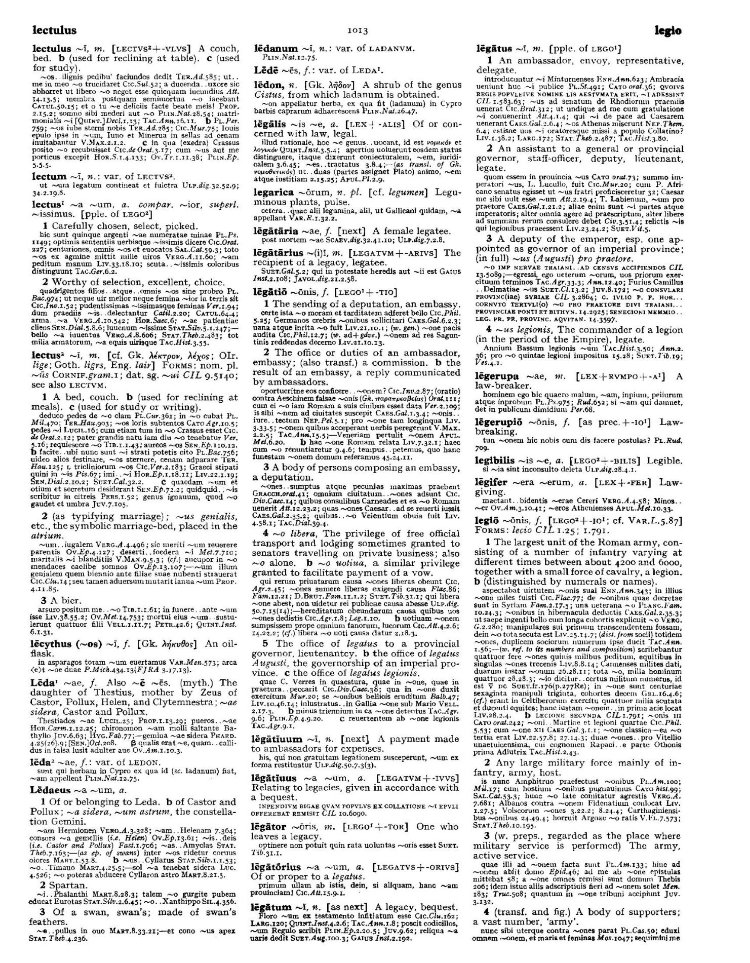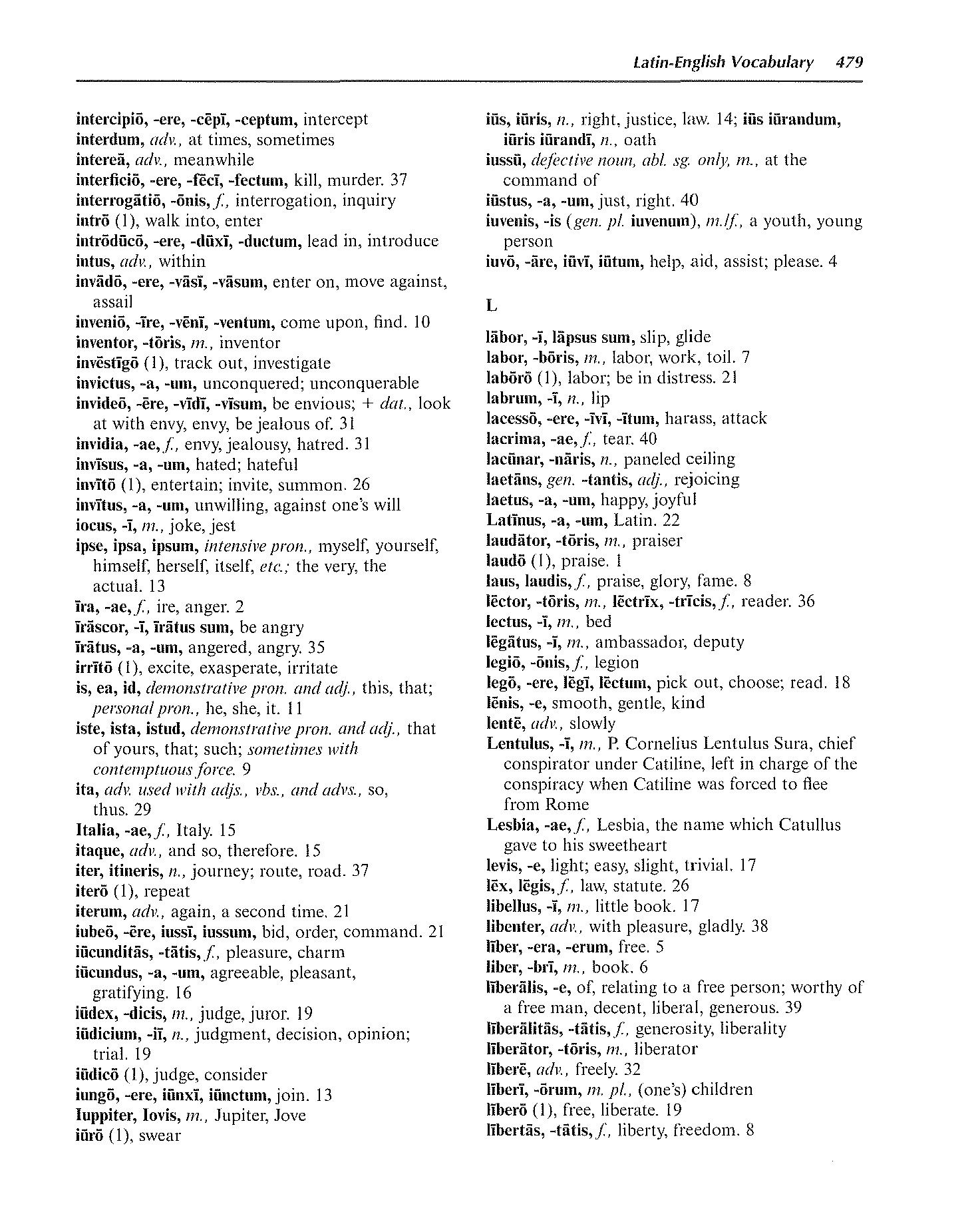
page_listing.tpl
page_subListingDetails.tpl
sub_listingDetails_style1.tpl
sub_listingDetails.title.tpl
legiō legion
legiō is a Latin Noun that primarily means legion.
Definitions for legiō
Wheelock's Latin
Noun
- 1
legion
Oxford Latin Dictionary
Noun
- 1
The largest unit of the Roman army, consisting of a number of infantry varying at different times between about 4200 and 6000, together with a small force of cavalry, a legion. (b) (distinguished by numerals or names).
- 2
Any large military force mainly of infantry, army, host.
- 3
(w. preps., regarded as the place where military service is performed) The army, active service.
Sentences with legiō
Latin to English
Qui dabat olim imperium fasces legiones omnia, nunc se continet atque duas tantum res anxius optat, panem et circenses.Compare Those who formerly made consuls and generals, had legions in their gift, and all the rest are content with much less now: they clamor for only two things -bread and games.
Duo legio urbanus ad incertus bellum scribo.Compare They enrolled two city legions to meet the uncertainties of war.
Magnus impetus legio sustineo.Compare He supports the violent charges of the legions.
Ille arma mitto, cornu, tuba, falx, signum, legio.Compare He sent arms, horns, trumpets, hooks, standards, and legions.
Non fero Romanum nomen sudataque bella et titulos tanto quaesitos sanguine carpi. detrahit invictis legionibus et sua Romae praemia deminuit, qui, quidquid fortiter actum est, adscribit Veneri, palpam victoribus aufert. [Contra orationem Symmachi,II,551)Compare I will not permit the name of Rome, whose wars cost so much toil, and whose glory was purchased at such cost of blood, to be disparaged. He who credits Venus with Rome's great exploits belittles the unconquered legions, destroys Rome's honor, takes away the palm from the victors.
Declension table for legiō
Cactus2000
| Singular | Plural | |
| Nom. | legiō | legiōnēs |
| Gen. | legiōnis | legiōnum |
| Dat. | legiōnī | legiōnibus |
| Acc. | legiōnem | legiōnēs |
| Abl. | legiōne | legiōnibus |
Data sources
Notes
- Definitions
- Frederick M. Wheelock, Wheelock's Latin, 6th ed., rev. Richard A. LaFleur (New York, NY: HarperCollins Publishers, 2005): 479.
- P. G. W. Glare, Oxford Latin Dictionary, Vols. 1-8 (Oxford: Clarendon Press, 1982): 1013.
- Word frequencies
- Christopher Francese, "Latin Core Vocabulary," Dickinson College Commentaries, last modified 2014, http://dcc.dickinson.edu.
- Paul B. Diederich, The Frequency of Latin Words and Their Endings, PhD diss., (Columbia University, 1939).
- Louis Delatte, Suzanne Govaerts, Joseph Denooz, and Etienne Evrard, Dictionnaire fréquentiel et index inverse de la langue latine [Frequency Dictionary and Inverse Index of the Latin Language] (Liège, Belgium: Laboratoire d'analyse statistique des langues anciennes de l'Université de Liège [L.A.S.L.A.], 1981): 120.
Bibliography
Allen, Joseph H. Allen and Greenough's New Latin Grammar for Schools and Colleges: Founded on Comparative Grammar. Edited by James B. Greenough, George L. Kittredge, Albert A. Howard, and Benjamin L. D'Ooge. Boston, MA: Ginn & Company, 1903.
Crystal, David. A Dictionary of Linguistics and Phonetics. 6th ed. Oxford, UK: Blackwell Publishing, 2008.
Delatte, Louis, Suzanne Govaerts, Joseph Denooz, and Etienne Evrard. Dictionnaire fréquentiel et index inverse de la langue latine [Frequency Dictionary and Inverse Index of the Latin Language]. Liège, Belgium: Laboratoire d'analyse statistique des langues anciennes de l'Université de Liège (L.A.S.L.A.), 1981.
Diederich, Paul B. The Frequency of Latin Words and Their Endings. PhD diss., Columbia University, 1939.
Francese, Christopher. "Latin Core Vocabulary." Dickinson College Commentaries. Last modified 2014. http://dcc.dickinson.edu/latin-vocabulary-list.
Gildersleeve, Basil L., and Gonzales Lodge. Gildersleeve's Latin Grammar: Third Edition, Revised, and Enlarged. 3rd ed. London, England: Macmillan and Co., 1903.
Glare, Peter G.W. Oxford Latin Dictionary. Vols. 1-8. Oxford, England: Clarendon Press, 1982.
Krüger, Bernd. "Latin Conjugation Tables." Cactus2000. Accessed May 5, 2023. https://latin.cactus2000.de/index.en.php.
Pierson, Nick. "Sound of Text." Accessed October 26, 2019. https://soundoftext.com.
Wheelock, Frederick M. Wheelock's Latin. 6th ed. Revised by Richard A. LaFleur. New York, NY: HarperCollins Publishers, 2005.
Wiktionary Contributors. "Victionarium." Wikimedia Foundation, Inc. Updated March 18, 2019. https://la.wiktionary.org/wiki/Victionarium:Pagina_prima.
Citation
Chicago (17th ed.)
Allo Contributors. "legiō, legiōnis (n.) - Latin Word Definition." Allo Latin Dictionary. Last modified . Accessed February 19, 2026. http://ancientlanguages.org/latin/dictionary/legio-legionis.
Entry created on . Last updated on .







